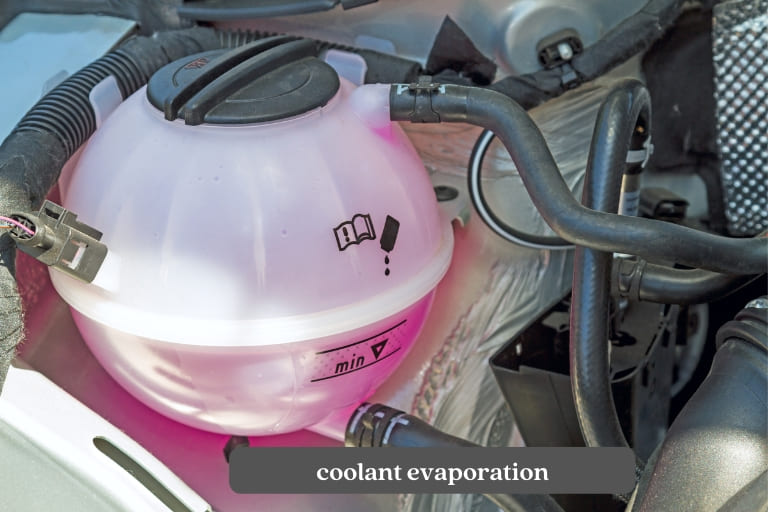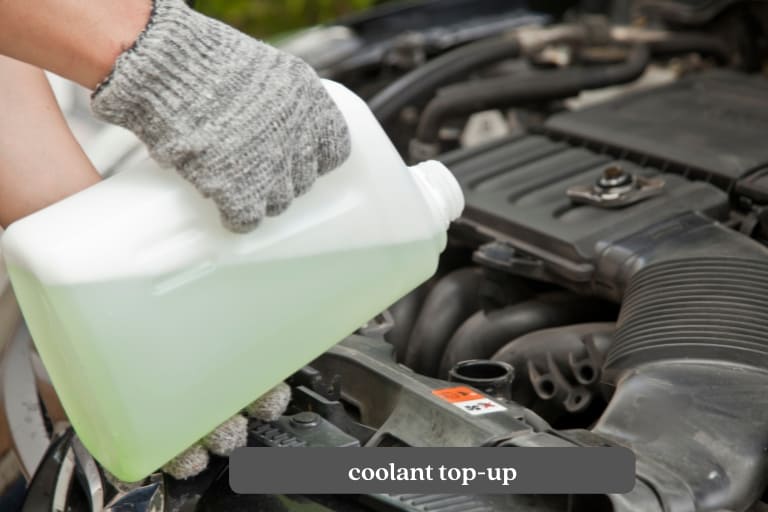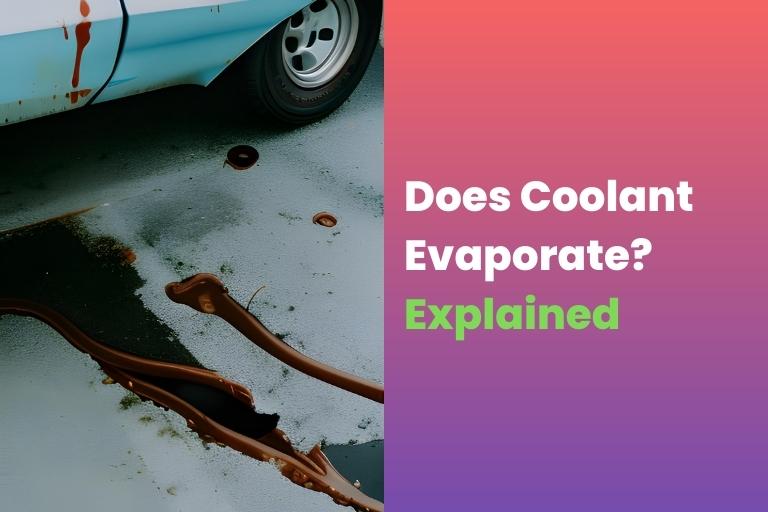You’re driving on a hot summer day with the AC blasting and music pumping, and suddenly you notice the temperature gauge creeping up toward the red zone. Panic sets in as you realize that your engine might be overheating!
Don’t worry. This is where coolant or antifreeze comes to the rescue. It helps regulate the engine’s temperature and prevents it from overheating or freezing in cold weather.
But what happens when your coolant level decreases due to evaporation? This can cause severe issues, such as corrosion, damage to the engine, overheating, and poor performance. As a result, it’s critical to understand why coolant evaporation happens and how to avoid it.
In this blog article, we’ll look at the reasons for coolant evaporation and offer some prevention measures. So, buckle up, and let’s dive in to keep your engine running smoothly and avoid any unexpected breakdowns on the road.
Contents
- 1 Does Antifreeze Evaporate Over Time?
- 2 Does Antifreeze Evaporate on Concrete?
- 3 Why Does My Coolant Keep Disappearing?
- 4 Does Coolant Evaporate In Hot Weather?
- 5 Will Coolant Evaporate If There’s A Leak?
- 6 Does Engine Coolant Evaporate Under Normal Circumstances?
- 7 Is My Coolant/Antifreeze Getting Low Because It Is Evaporating?
- 8 Conclusion
Does Antifreeze Evaporate Over Time?

Have you ever wondered if antifreeze evaporates over time? Well, the answer is no, but let’s break it down into three key points:
Firstly, antifreeze itself is a chemical mixture designed to withstand high temperatures and prevent freezing in cold weather. It’s not the antifreeze that evaporates but rather the water in the coolant.
Secondly, the evaporation rate can depend on various factors such as temperature, pressure, humidity, and exposure to air. So, if you live in a hot and dry climate, the water in the coolant may evaporate faster than if you live in a cooler and more humid climate.
Lastly, when the water in the coolant evaporates, it can cause the antifreeze to become more concentrated, making it less effective in regulating the engine’s temperature. This might result in engine damage, overheating, or decreased performance.
So, it’s essential to regularly check the coolant level and maintain the cooling system to prevent evaporation and ensure your engine is running smoothly. Remember, prevention is better than cure!
Does Antifreeze Evaporate on Concrete?

Have you ever wondered if the antifreeze that you accidentally spilt on your garage floor or driveway would evaporate? Here are some key points to consider:
- If antifreeze spills or leaks from your car onto concrete, it can evaporate. The evaporation rate can depend on temperature, humidity, and airflow. If the temperature is high and there’s low humidity or airflow, the antifreeze may evaporate faster.
- When antifreeze evaporates on concrete, it can leave behind stains and residues that are hard to remove. These stains can be unsightly and can damage the concrete surface over time. To avoid this, it is critical to clear up any spills as soon as possible.
- Evaporated antifreeze can threaten animals and humans who may accidentally ingest it. Antifreeze contains toxic chemicals that can be fatal if ingested. It’s crucial to clean up spills and leaks properly to prevent harm to yourself, your pets, or wildlife.
Thus antifreeze can evaporate on concrete if it spills or leaks from your car. It is imperative to wipe up spills as soon as possible to avoid stains and residues and to protect animals and humans. Always handle antifreeze with care to keep yourself and the environment safe.
Why Does My Coolant Keep Disappearing?
As a car owner, you may have noticed that your car’s coolant level keeps dropping, even though you’ve recently topped it up. This can be a cause for concern, as a lack of coolant can lead to your engine overheating, which can cause significant damage. There are a few factors that could be causing your coolant to keep disappearing, and it’s important to identify the cause to prevent further problems.
One reason why your coolant may be disappearing is due to evaporation. Over time, coolant can evaporate from the system, particularly in hot weather conditions. If you suspect that this is the cause, it’s essential to keep an eye on the coolant level and replenish it as required. However, if the coolant level keeps dropping rapidly, it’s likely due to a leak in the system.
To identify the cause of disappearing coolant, it’s important to check for signs of leaks. Look for wet spots, stains, cracks, or holes in hoses, radiators, water pumps, or reservoirs. Leaks can occur due to worn or damaged parts or improper installation. If you notice any of these signs, it’s crucial to have your car inspected by a qualified mechanic to prevent further damage.
Another factor to consider when your coolant keeps disappearing is the color and consistency of the coolant. If it’s brownish, sludgy, or oily, it may indicate a head gasket failure or oil contamination. These are more serious issues that require immediate attention, and taking your car to a mechanic for diagnosis and repair is best.
Does Coolant Evaporate In Hot Weather?
Coolant can evaporate in hot weather due to the system’s high temperature and low pressure. This can be an issue since low coolant levels can cause engine overheating and damage.
To prevent evaporation in hot weather, it’s essential to use a proper mixture of water and antifreeze that has a high boiling point and low freezing point. The recommended mixture is usually 50/50, but this can vary depending on the climate and your car’s specific requirements. Check your owner’s handbook or a technician to find the proper mixture for your vehicle.
It’s also essential to check the coolant level regularly, especially during hot weather. If you notice that the level has dropped, refill it as needed. This will help ensure that your engine stays properly cooled and prevent any damage that can result from low coolant levels.
Thus, coolant can evaporate in hot weather due to high temperatures and low pressure in the system. To prevent this, use the right mixture of water and antifreeze, and check the coolant level regularly to keep your engine running smoothly and avoid damage.
Will Coolant Evaporate If There’s A Leak?
Yes, coolant can evaporate if there’s a leak in the system because it allows the coolant to escape and come into contact with air, which can cause it to evaporate. This could cause the engine to overheat and harm it.
As the coolant leaks out, it can come into contact with the hot engine components and evaporate, leaving stains and deposits on the engine and other parts. Environmental elements such as temperature, humidity, and wind influence the rate of evaporation.
One can use various tools and methods to identify and fix leaks, such as a pressure tester, a dye test kit, or a visual inspection. When a leak is identified, it must be repaired as soon as possible to prevent more damage and coolant loss.
It may be necessary to replace damaged or worn-out parts such as hoses, clamps, seals, or gaskets. Frequent maintenance and checkups can avoid leaks and keep the cooling system running smoothly.
Does Engine Coolant Evaporate Under Normal Circumstances?
Yes. Engine coolant can evaporate under normal circumstances due to the constant heat and pressure of the engine and the system’s normal wear and tear over time. However, the rate of evaporation is typically low and should not result in a significant loss of coolant.
Following the manufacturer’s recommendations for changing the coolant at regular intervals based on mileage or time is essential to prevent excessive evaporation under normal circumstances. This will ensure that the coolant is fresh and effective at preventing overheating or freezing of the engine.
It is also crucial to use a high-quality coolant that meets the specifications of the vehicle. Using the wrong type of coolant or diluting it with water can lead to a faster rate of evaporation and potentially damage the engine. Routine cooling system maintenance and inspection can also assist in uncovering leaks or concerns before they become more problematic.
Is My Coolant/Antifreeze Getting Low Because It Is Evaporating?
Low coolant levels can be attributed to evaporation, but it is not the only cause. Other common causes of low coolant levels include leaks, engine overheating, or a faulty radiator cap. Learn more about how coolant comes out of the radiator cap.
To determine the cause of low coolant levels, one should check for signs of leaks such as wet spots, stains, cracks, or holes in hoses, radiators, water pumps, or reservoirs. One should also check the colour and consistency of the coolant. If it is brownish, sludgy, or oily, it may indicate a head gasket failure or oil contamination.
If there are no signs of leaks or contamination, one can perform a pressure test to check for leaks or a compression test to check for engine problems. It is also essential to check the coolant level regularly and refill it if needed to prevent engine damage from overheating.
Also, Check the following:
- 9 Signs You Need a Coolant Flush
- Can Low Coolant Level Cause a Check Engine Light?
- Why Is the Air Compressor Pushing Coolant Out?
- Coolant Under Pressure When Cold
- Coolant Coming Out of the Overflow
- Can You Put Ice in Your Coolant?
- What Happens if You Don’t Flush Coolant?
- Can Coolant Flush Cause Leaks?
Conclusion
Furthermore, knowing coolant evaporation is critical for the health and function of your vehicle’s engine. Evaporation can occur due to various factors such as temperature, pressure, humidity, and exposure to air.
It can lead to severe issues like corrosion, damage, overheating, and poor engine performance. To prevent excessive evaporation, one should use a high-quality coolant, follow the manufacturer’s recommendations for changing the coolant at regular intervals, and keep an eye on the coolant level.
If the coolant level is continually low, it may indicate a system leak that must be located and repaired immediately. Following these basic practices will help you prevent costly repairs and keep your car running smoothly for years.
